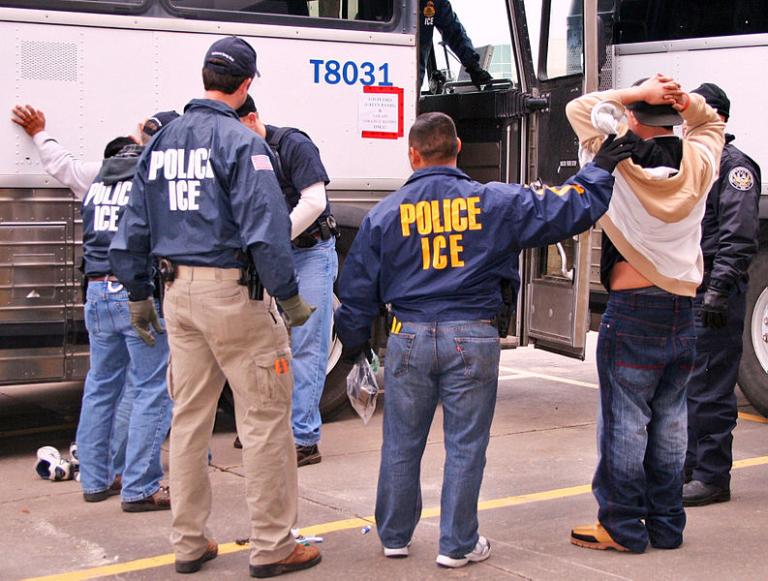
That’s the gist of an argument among fellow Patheos writers that seems to have transpired while I was on vacation. And I’m not going to dig into the specific comments any of the authors made, not least because that requires acquainting myself with the full back-and-forth rather than the single article I’ve seen, but also because I don’t like the business of taking apart a single author without knowing how influential the article is (and, yes, Patheos discontinued “share” counts due to technical issues, so I can’t tell how widely read another author or article is).
But let’s back up:
Is illegal immigration — including a host of actions, depending on the circumstances, from illegal border crossing to forged identification (which can vary from simply falsified ID to identity documents stolen from another person or used with their knowledge) to working under the table to pickpocketing, the destruction of property that comes with illegal squatting, and so on, a sin? I presume it is without dispute that a person immigrating because his life is threatened in his home country commits no sin, so long as he does not use that immediate threat of harm to justify criminal actions that are not themselves necessary to preserve his life. And I presume we can define “life threatened” broadly to include both the sort of desperate poverty, famine, etc., that was the cause of the Irish immigration to the US during the Potato Famine, as well as persecution due to religion or ethnic group. (Is there a surefire natural right to immigrate regardless of a host country’s laws, in the case where you’re simply not allowed to practice your religion openly? Probably not.)
But what of a person who has the ability to provide for his material needs (and his family’s) in his home country but simply wants to improve his standard of living — e.g., the Africans coming to Europe with dreams of streets paved with gold (and who stayed in The Jungle in Calais scheming to cross to the U.K. for better social welfare benefits) or families leaving refugee camps in Turkey to cross to Greece back a couple years ago? One guesses that most people, even those who strongly support aid for refugees and a generous policy on asylum, would acknowledge that it’s wrong to violate a country’s laws merely for the desire of personal gain.
Of course, the trouble is setting the bounds. Is it enough to justify illegal immigration that the crime rate in your home country is high? That poverty is so deep that you’ll worry about providing for your family even though in reality no one is actually going to starve to death?
Some de facto open borders advocates, even, let’s face it, some Catholics (yes, Cardinal Cupich, and I blogged about it at some point though I can’t find the link now — though I don’t know about the Pope himself), have pretty much said that even in the circumstance in which what you’re up to is simply seeking a comparatively better life for your family, regardless of the particulars of the material or safety conditions of your home country, that illegal immigration is A-OK. I’m sorry, but I just don’t believe that this is in accordance with Catholic doctrine. Your mileage may vary, I guess, but here’s the text of the catechism (as cited by the USCCB):
The more prosperous nations are obliged, to the extent they are able, to welcome the foreigner in search of the security and the means of livelihood which he cannot find in his country of origin.
Likewise, that same link quotes a bishops’ letter from 2003:
[w]hen persons cannot find employment in their country of origin to support themselves and their families, they have a right to find work elsewhere in order to survive. Sovereign nations should provide ways to accommodate this right.
Again, note that the official “party line” is about survival, not mere improvement in standards of living.
And this particular webpage advocates for a specific set of policy proposals that the bishops believe that the United States government ought to undertake. Which is all fine, I guess — everyone’s got their ideas and proposals, and sure, the bishops can present theirs, though, again, note that they call for legalization programs, widened access to guest worker programs and increased visas for family reunification, on the basis that (an implied) all illegal immigrants have come here for the fundamental goal of ensuring their families’ survival due to life-threatening poverty at home, which simply seems to be a misstatement of fact.
But if we move from a set of best-practice, ideal policy preferences to a Sin List, that is, to decreeing what set of policies an American Catholic must support in order to not fall into sin, well, here there be dragons. Heck, virtually no bishops are willing to even state that providing political support for abortion is wrong — an act regarding which there is nothing open for interpretation or individual interpretation, as with the question of how much of a threat to life is sufficient to justify the law-violation of illegal immigration. How can one declare definitely that is it a Sin of Omission to fail to support some specific political policy with respect to immigration? How can one define a specific number of immigrants who must be admitted to the United States to meet the “stranger-welcoming” requirement?
But wait.
What about the Children In Cages?
Does the fact that there has been such a massive increase in the number of people crossing our border and claiming asylum (some with legitimate cases, others merely as a means of entering the United States to improve their standard of living, having been coached or learning through their community networks of what claims to make, or needing to make no claim at all due to the degree to which the system has been overwhelmed), and that as a result detention centers and the asylum processing system have been overwhelmed, warrant admitting individuals into the United States open-endedly because the alternative is unacceptable human suffering?
To be honest, I’m rather resentful of the claim that these migrants can collectively compel their admittance into the United States in this manner. (And let’s face it, eliminating detention, when paired with a refusal to enforce immigration laws “in the interior” through deportation or even enforcement of prohibitions of working with stolen or forged proof of work authorization or working under the table, is a de facto permanent residency under “second class” living conditions.) One might just as reasonably accuse Democrats who are failing to push for greater funding for better-equipped detention centers, more immigration judges, etc., and instead claiming the only alternative is immediate release and provisional residency as playing a game of “chicken” with the well-being of these migrants as pawns.
So there you have it. Veni ad me, fra!
Image: https://commons.wikimedia.org/wiki/File%3A100203houston_lg.jpg; By U.S. Immigration and Customs Enforcement (ICE), www.ice.gov. Please credit by saying “Photo Courtesy of ICE”. [Public domain], via Wikimedia Commons








